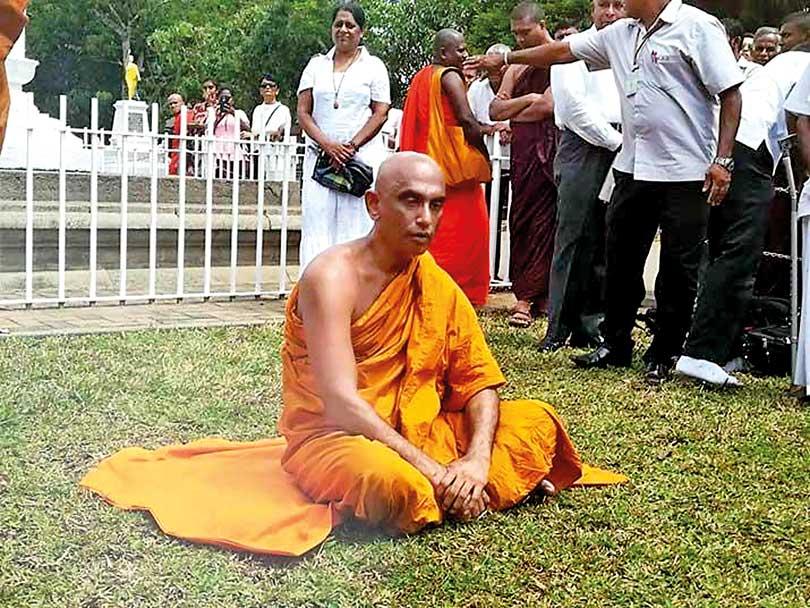Reply To:
Name - Reply Comment

 Ajith Fernando, an old friend and an incredibly good and humble human being, got it right when he said, ‘Terrorists don’t win when they manage to kill 200, 300 innocent people. They win when they manage to alienate and isolate the entire Muslim population.’
Ajith Fernando, an old friend and an incredibly good and humble human being, got it right when he said, ‘Terrorists don’t win when they manage to kill 200, 300 innocent people. They win when they manage to alienate and isolate the entire Muslim population.’
Now, broadly speaking, there are two ways in which a community can become alienated and isolated. First, if the rest of the population, out of fear, prejudice or for some other reason, conflates that community with the terrorists, in this case the National Thawheed Jama’at (NTJ)or the ISIS or in general terms, the ‘Jihaadists’ (of whom there can be and are many variants), all acting in the name of Allah, the greater Islamic community and as per their reading of the Quran. Secondly, the community can for reasons of security (closing of the ranks so to speak, operating on the notion ‘me against my brother, but my brother and I against others’) or conviction alienate and isolate itself. Where alienation and isolation do occur we tend to see one of the above two or both in varying degrees of intensity.
Strangely, in Sri Lanka, at least in views expressed in English, the dominant view is that a) there IS alienation and isolation of Muslims, and b) it is a condition imposed on the Muslims, one in which they have not played any role.
These views have gained a lot of credence thanks to some very tangential and even pernicious statements. Today we have the US House Committee on Foreign Affairs expressing concerns about ‘the demonizing of Muslims in Sri Lanka’. That’s rich, coming from one of the world’s most racist countries where Muslim-demonization is almost an article of faith.
We also have Mangala Samaraweera’s multiple tweets: a) ‘Hatred is never appeased by hatred. By non-hatred alone is hatred appeased. This is a law eternal.’ Today it was left to our Muslim Ministers to exhibit this sacred teaching of Lord Buddha while imposters in robes incited hatred in his name. A shameful day for our beloved #lka; and b) #Cardinal Malcolm Ranjith fanning the flames of hatred and communalism by visiting fasting robed MP Rathana. #Vatican TAKE NOTE! Mangala just can’t help attacking the Buddhist Order and the Buddhist community while at the same time sweeping under the carpet the context. One notes that he has never once tweeted about ‘imposters in the clothing worn by Islamic clerics,’ when referring to the NTJ.
The greatest threat to unity, reconciliation, co-existence and peace among all communities, is Islamic extremism
So we have, all of a sudden, a ‘situation’ where the Cardinal is ‘fanning the flames of communalism and racism.’ We have the ‘Muslims being demonized’. Perhaps we should talk of all demonizations and delve into the real demonizers.
The New York Times quotes Rauff Hakeem, leader of the Sri Lanka Muslim Congress: ‘Our people fear a blood bath.’ Existential fears are not the preserve of the Muslim community though; if people are terrified in ways they have not been for 10 years, it is because of the Easter Sunday attacks, carried out, let us repeat, in the name of Allah, with the expressed affirmation of a reading of the Quran and of course the Islamic faith. Wariness can make people imagine all kinds of doom’s day scenarios. Given the affirmed religious identity of the terrorists, it is not unnatural for people to be wary of that community.
 That said, to use words such as ‘demonization’ and to vilify efforts that seek justice as a means to a quick resolution and thereby the creation of a situation where mutual respect, trust etc., can take root, does not help. In fact it can have the opposite effect. The Buddhist community did not carry out or sanction a terrorist attack. Neither did the Muslim community as a whole. There was an attack that killed hundreds of people; it was not done in the name of the Buddha. If people don’t want a sense of proportion, if they want to play the margins, make mountains out of molehills etc., they are not helping. They are fanning the flames of discontent, they are feeding extremism.
That said, to use words such as ‘demonization’ and to vilify efforts that seek justice as a means to a quick resolution and thereby the creation of a situation where mutual respect, trust etc., can take root, does not help. In fact it can have the opposite effect. The Buddhist community did not carry out or sanction a terrorist attack. Neither did the Muslim community as a whole. There was an attack that killed hundreds of people; it was not done in the name of the Buddha. If people don’t want a sense of proportion, if they want to play the margins, make mountains out of molehills etc., they are not helping. They are fanning the flames of discontent, they are feeding extremism.
What’s the truth here? Here are the facts. First. The call was for the removal of three persons. The resignation of six persons whose removal was not sought in solidarity with three persons who are under a cloud (on account of statements made and close association with terrorist suspects) raises a simple question: identification with that very same ‘cloud’? A wit quipped, ‘if a Parliamentarian is accused of raping a woman and called on to resign or it sought to be removed, should all men resign in solidarity?’
Second. Rathana Thera’s efforts, as mentioned above, drew the support of all communities, Muslims included. Sure, there were a lot of snide comments about Rathana Thera joining Muslims in their fast with hardly any comments on his demands or the context in which they were made, but there were many who were in complete agreement with the Thera’s position. There was absolutely no conflation of Muslims and the Jihaadists. Cardinal Malcolm Ranjith in supporting the Thera put the full weight of the Catholic Church behind the effort. Tamil politicians joined the fast. In short there was solidarity of the kind rarely seen in recent times for protests of this kind.
Third. There is a strange reluctance to address the real and terrible threat to all Sri Lankans; jihaadist terrorism. Nothing has threatened to tear this country apart and rendered the entire citizenry vulnerable in the past 10 years as the Jihaadist attacks. That threat is real. The entire drama about some kind of Sinhala Buddhist ‘backlash’ is in this context a distraction. It plays into the hands of the Jihaadists.
What can one expect to happen when the terrorists are spoken of in tokenist terms or ignored altogether and at the same time vilify those who have not conflated terrorists and the community they belong to, just because they happen to belong to a majority community? Is that not pernicious conflation? Does it not alienate Sinhalese and Buddhists? And if and when that happens, would you expect Sinhalese and Buddhists to pretend to be asleep or unconscious?
What’s the truth here? Here are the facts. First. The call was for the removal of three persons
Well, that’s what one can call the ‘Mangala Sutra’, ‘Mangala’ as a symbol and representative of all those whose passion has been to vilify the Sinhala Buddhists. Well, now it seems that this phenomenon can be trumped by what one may call the ‘Rathana Sutra’ but only if Ven Athureliye Rathana Thero says a lot of things, which need to be prefaced as follows:
‘The greatest threat to unity, reconciliation, co-existence and peace among all communities, at this particular moment is Islamic extremism. The people must unite to fight this threat. However, we must not forget that if we do not do our utmost now and always to make sure that everyone feels safe, if we do not protect one another, if we directly or indirectly feed other extremism, this task will only become that much more difficult.’
Yes, Ajith Fernando has raised a pertinent point. Isolation and alienation never helps. Let us not push anyone to or allow anyone to push us to such dreadful places.
[email protected]. www.malindawords.blogspot.com